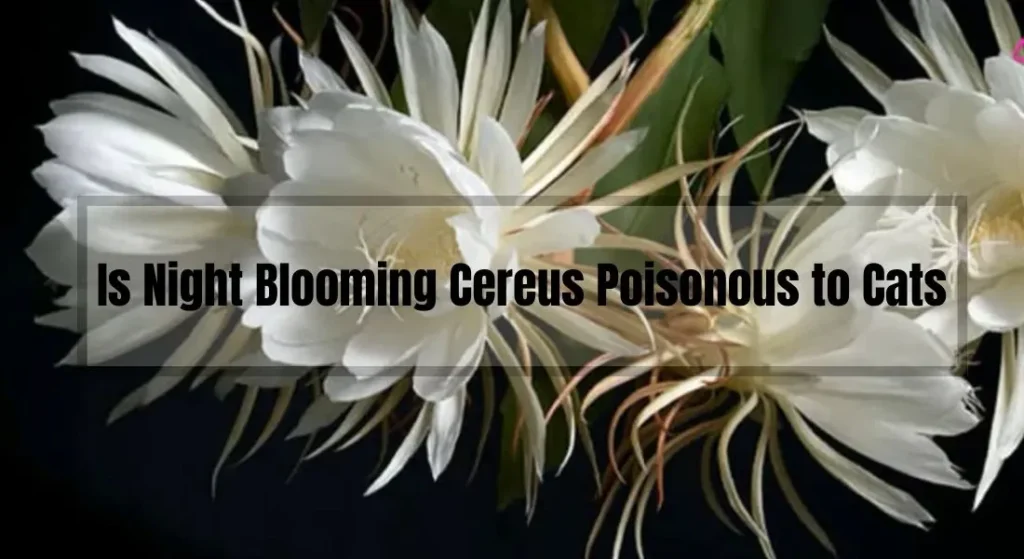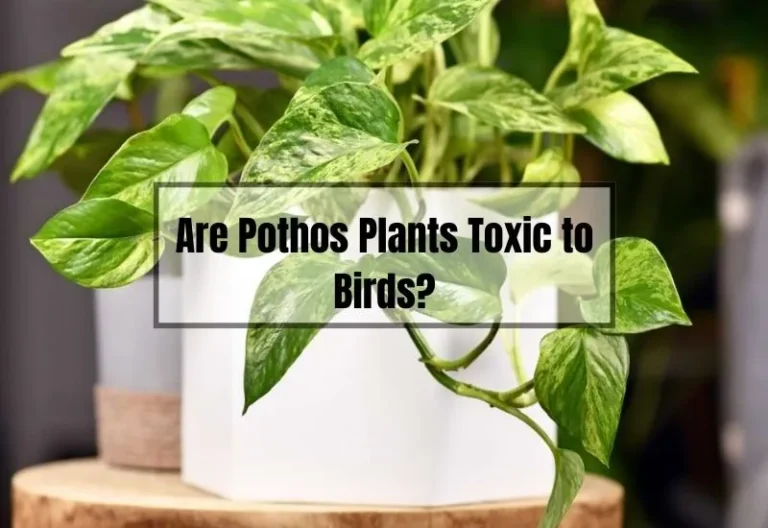Is Night Blooming Cereus Poisonous to Cats? Dispelling Myths and Fears
Are you a proud cat owner who loves to grow indoor plants? If so, you may have heard of the night blooming cereus, a beautiful cactus that produces stunning flowers that bloom at night.
However, if you’re a responsible pet owner, you may be wondering whether this plant is poisonous to your furry friend. In this article, we’ll explore the question, “Is night blooming cereus poisonous to cats?”
According to the American Society for the Prevention of Cruelty to Animals (ASPCA), night blooming cereus is not poisonous to cats. This means that if your cat nibbles on the delicate leaves of this plant, it shouldn’t cause any harm. However, it’s important to note that just because a plant is non-toxic doesn’t mean it’s entirely safe for your cat to ingest.
Ingesting large quantities of any plant material can cause vomiting and gastrointestinal upset, so it’s still important to monitor your cat’s interactions with your indoor plants.
Key Takeaways
- Night blooming cereus is not poisonous to cats, according to the ASPCA.
- Ingesting any plant material can cause vomiting and gastrointestinal upset in cats.
- It’s still important to monitor your cat’s interactions with indoor plants, even if they are non-toxic.
Is Night Blooming Cereus Poisonous to Cats

If you’re a cat owner, you know that cats are curious creatures and love to explore their environment. This includes nibbling on plants, and as a responsible pet owner, it’s important to know which plants are safe for your furry friend. One plant that you may be wondering about is the night blooming cereus. So, is night blooming cereus poisonous to cats? Let’s find out!
Night blooming cereus is non-toxic to cats. This means that if your cat ingests some of this plant, it is unlikely to cause any harm. However, it’s important to note that just because a plant is non-toxic doesn’t mean that it’s completely safe for your cat to consume. Ingesting any plant material can still cause gastrointestinal upset, so it’s best to discourage your cat from eating plants altogether.
While night blooming cereus is generally safe for cats, it’s important to keep in mind that some cats may have allergies or sensitivities to certain plants. If you notice any unusual symptoms in your cat after they’ve been exposed to night blooming cereus or any other plant, such as vomiting, diarrhea, or lethargy, contact your veterinarian right away.
In addition to being non-toxic to cats, night blooming cereus has some other benefits that make it a great addition to your home. This plant is known for its beautiful, fragrant blooms that only open at night, making it a unique and intriguing addition to any garden or indoor space. Plus, it’s easy to care for and can thrive in a variety of conditions.
Understanding Night Blooming Cereus
If you’re a cat owner and love indoor plants, you might have heard of the night blooming cereus. This beautiful cactus is known for its large, fragrant, and showy white flowers that bloom at night. But if you’re wondering whether night blooming cereus is safe for your feline friend, then keep reading.
Night blooming cereus, also known as Queen of the Night, is a tropical cactus that belongs to the Cactaceae family. This plant is native to Central and South America and is widely cultivated for its ornamental value. While night blooming cereus is not toxic to cats, it’s always better to be cautious when it comes to your pet’s safety.
If you’re planning to bring home a night blooming cereus, it’s important to know how to care for it properly. Here are some tips:
- Light: Night blooming cereus prefers bright but indirect sunlight. It’s best to keep it near a window that receives morning or evening sunlight.
- Water: Water your night blooming cereus only when the topsoil is dry to the touch. Overwatering can lead to root rot, which can be fatal for the plant.
- Temperature: Night blooming cereus thrives in warm temperatures between 60-80°F. Keep it away from cold drafts or air conditioning vents.
- Fertilizer: You can fertilize your night blooming cereus once a month during the growing season (spring and summer) with a balanced fertilizer.
While night blooming cereus is safe for cats, it’s always better to keep an eye on your pet around indoor plants. Cats are curious creatures and may nibble on plants out of boredom or curiosity. If you notice any signs of vomiting, diarrhea, or lethargy in your cat, contact your veterinarian immediately.
Symptoms of Poisoning in Cats
If your cat has ingested night blooming cereus, it may show a variety of symptoms.
Here are some common signs of poisoning in cats:
- Vomiting and diarrhea
- Loss of appetite
- Lethargy and weakness
- Increased thirst and urination
- Seizures and tremors
- Difficulty breathing
- Abnormal heart rate and rhythm
- Dilated pupils and blurred vision
- Jaundice and anemia
If you notice any of these symptoms in your cat, it is important to seek immediate veterinary care. The severity of the symptoms will depend on the amount of plant material ingested and the size and health of your cat.
Night blooming cereus contains toxic compounds that can affect your cat’s digestive, nervous, and cardiovascular systems. The plant’s sap and thorns can also cause skin irritation and injury.
It is important to keep night blooming cereus and other toxic plants out of your cat’s reach. If you have plants in your home or garden, make sure they are safe for cats before bringing them indoors or allowing your cat to roam outside.
In addition to night blooming cereus, there are many other common household items that can be toxic to cats, including certain foods, medications, and cleaning products. Be sure to keep these items stored safely and out of your cat’s reach.
Remember, prevention is the best way to protect your cat from poisoning. Keep a watchful eye on your furry friend and seek veterinary care if you suspect that they have ingested something harmful. By taking these simple steps, you can help keep your cat safe and healthy.
What to Do If Your Cat Ingests Night Blooming Cereus

If you suspect that your cat has ingested night blooming cereus, it’s important to act quickly. Even though this plant is non-toxic to cats, it’s still possible for your cat to have an adverse reaction to the plant or to experience an allergic reaction.
Here are some steps to follow if your cat ingests night blooming cereus:
- Observe your cat: Keep a close eye on your cat and look for any unusual behavior or symptoms. Symptoms of poisoning or an allergic reaction may include vomiting, diarrhea, lethargy, loss of appetite, or difficulty breathing.
- Contact your veterinarian: If your cat exhibits any unusual behavior or symptoms, contact your vet immediately. Your vet can provide guidance on the next steps to take and may recommend bringing your cat in for an examination.
- Provide supportive care: If your cat is experiencing vomiting or diarrhea, it’s important to keep them hydrated. Offer your cat small amounts of water frequently to prevent dehydration. You can also offer your cat a bland diet of boiled chicken and rice to help settle their stomach.
- Monitor your cat: Keep a close eye on your cat and monitor their behavior and symptoms. If their symptoms worsen or if you notice any new symptoms, contact your vet immediately.
Preventing Cat Exposure to Night Blooming Cereus
As a cat owner, it’s important to ensure that your furry friend stays safe and healthy. One way to do this is by preventing exposure to toxic plants such as the night blooming cereus. While this plant is non-toxic to cats, it’s still important to take precautions to ensure that your cat doesn’t ingest any part of the plant.
Here are some tips to help you prevent cat exposure to night blooming cereus:
- Keep the plant out of reach: Place the night blooming cereus in an area where your cat can’t access it. This can be on a high shelf or in a room that your cat doesn’t have access to.
- Supervise your cat: If you have the night blooming cereus in an area that your cat can access, make sure to supervise your cat while they’re in the same room as the plant. This will allow you to intervene if your cat shows any interest in the plant.
- Distract your cat: If your cat is showing interest in the night blooming cereus, distract them with a toy or treat. This will redirect their attention away from the plant.
- Use deterrents: You can use deterrents such as bitter sprays or double-sided tape to discourage your cat from getting too close to the night blooming cereus.
- Train your cat: Training your cat to stay away from the night blooming cereus can be helpful. You can use positive reinforcement techniques such as treats or toys to reward your cat for staying away from the plant.
By following these tips, you can help ensure that your cat stays safe and healthy while also enjoying the beauty of the night blooming cereus. Remember, prevention is key when it comes to protecting your cat from toxic plants.
Frequently Asked Questions (FAQs)
Is night blooming cereus toxic to dogs?
Night blooming cereus is non-toxic to dogs. However, it is still best to keep your dogs away from plants that are not part of their diet.
Is queen of the night poisonous to cats?
Queen of the night, also known as night blooming cereus, is not poisonous to cats.
Is Night Blooming Cereus the same as Queen of the Night?
Yes, night blooming cereus is the same as queen of the night. Both names refer to the same plant, scientifically known as Hylocereus undatus.
Are pansies poisonous to cats?
Pansies are not poisonous to cats.
Conclusion
In conclusion, the Night Blooming Cereus plant is not considered to be toxic to cats. However, it is important to note that the consumption of any plant material can cause gastrointestinal discomfort, skin irritation, vomiting, blistering of the gums, and mouth irritation in cats.
If you have a cat in your home, it is always best to err on the side of caution and keep potentially harmful plants out of their reach. While the Night Blooming Cereus may not be toxic to cats, it is still important to monitor your cat’s behavior if they come into contact with the plant.
If you suspect that your cat has ingested any part of the Night Blooming Cereus or any other plant that you believe may be harmful, seek veterinary attention immediately. Early intervention can save your cat’s life.




